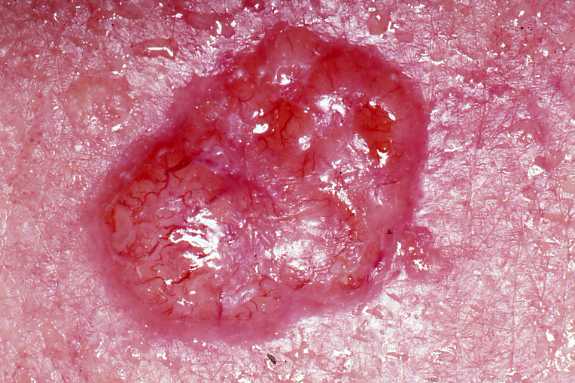Agilent Technologies announced that the US Food and Drug Administration (FDA) has approved its PD-L1 IHC 22C3 pharmDx assay for expanded use.

Image: Photograph of a basal cell carcinoma. Photo: Courtesy of john hendrix/wikipedia
The assay is now approved as an aid in identifying patients with head and neck squamous cell carcinoma (HNSCC) for treatment with KEYTRUDA (pembrolizumab), anti-PD-1 therapy manufactured by Merck (known as MSD outside the United States and Canada). KEYTRUDA, as a single agent, is indicated for the first-line treatment of patients with metastatic or with unresectable, recurrent HNSCC whose tumors express PD-L1 (CPS ≥ 1) as determined by an FDA-approved test.
PD-L1 IHC 22C3 pharmDx is the only companion diagnostic FDA-approved to aid in the identification of HNSCC patients for treatment with KEYTRUDA. HNSCC is the fifth cancer type for which PD-L1 IHC 22C3 pharmDx has gained FDA approval in the United States.
“Targeted immunotherapies are redefining standards of care in cancer treatment, and PD-L1 testing plays a crucial role in identifying patients who may benefit from this treatment,” said Sam Raha, president of Agilent’s Diagnostics and Genomics Group. “The expanded FDA approval of PD-L1 IHC 22C3 pharmDx provides critical information to physicians managing first-line treatment of patients with metastatic or with unresectable, recurrent HNSCC. By expanding the use of PD-L1 IHC 22C3 pharmDx, Agilent enables more patients to be identified for treatment with KEYTRUDA. Through these efforts, we reinforce our role as a worldwide leader in driving companion diagnostics to market in support of landmark therapies.”
HNSCC is the seventh most common cancer worldwide and accounts for more than 90% of head and neck cancer cases. In the United States, approximately 65,000 new head and neck cancer cases are diagnosed annually. The five-year overall survival rate for this form of cancer is approximately 40–50 percent.
KEYTRUDA is a humanized monoclonal antibody that increases the ability of the body’s immune system to help detect and fight tumor cells. KEYTRUDA blocks the interaction between PD-1 and its ligands, PD-L1 and PD-L2, thereby activating T lymphocytes, which may affect both tumor cells and healthy cells. KEYTRUDA and other targeted immunotherapies are revolutionizing cancer treatment, and their therapeutic value is being demonstrated across a growing list of cancer types.
Agilent is a worldwide leader in partnering with pharmaceutical companies to develop immunohistochemical-based diagnostics for cancer therapy. Agilent developed PD-L1 IHC 22C3 pharmDx in partnership with Merck & Co. PD-L1 IHC 22C3 pharmDx also helps physicians identify non-small cell lung cancer (NSCLC), cervical cancer, gastric or GEJ adenocarcinoma, and urothelial carcinoma patients for treatment with KEYTRUDA. PD-L1 expression in NSCLC tissues is interpreted using Tumor Proportion Score (TPS). PD-L1 expression in HNSCC, urothelial carcinoma, cervical cancer, and gastric or GEJ adenocarcinoma tissues is interpreted using Combined Positive Score (CPS).
Source: Company Press Release
